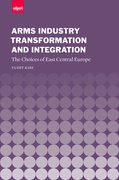 |
|||
 |
|||
| SIPRI Update: Global Security & Arms Control | |||
|
|||
Monitoring international arms transfersThe global arms market is changing, and major buyer states are using an advantageous market position to get more out of their defence transactions. SIPRI's new Arms Transfers and Arms Production Programme is well placed to address these emerging dynamics and issues, argues Aude Fleurant. Continue reading ... |
SIPRI launches data on military expenditureOn 14 April SIPRI launched its data on world military expenditure in 2013 via traditional media channels and launch events in New York and Geneva (see below). This was the third and final data launch ahead of the release of SIPRI Yearbook 2014. Continue reading ... |
Looking back on 2013 at SIPRISIPRI's new Annual Review contains highlights from the year that was 2013, featuring our research programmes, flagship SIPRI events and publications, significant media coverage, financial information, staff facts and an introduction by SIPRI's Director, Professor Tilman Brück. Continue reading ... |
 |
The wider applications of the Nuclear-Test-Ban TreatyWhile the civilian and disaster-related applications of the Comprehensive Nuclear-Test-Ban Treaty Organization’s monitoring systems are extremely useful, it is important to remember that the purpose of the Nuclear-Test-Ban Treaty is the abolition of all nuclear tests, argues Tariq Rauf. Continue reading ... |
Guns or butter?Looking at the timelines for construction, appropriations of design and construction funds and commitments to the local community can shed light on the real motivation for project continuation in the cases of two nuclear reactors in Iran and the United States, argues Robert Kelley. Continue reading ... |
| RECENT EVENTS |  |
|
27–28 March, Stockholm SIPRI and the Swedish Ministry for Foreign Affairs co-hosted a high-level forum with the theme of 'Freedom from Violence'. Over 200 participants attended the event, which will become an annual fixture on the security and development calendar in Stockholm. Read the full report from the Forum, view our Flickr photostream or read more about the event (in Swedish) on the website of the Swedish MFA. 11 April, Centralposthuset, Stockholm The Swedish Ministry for Foreign Affairs in cooperation with SIPRI and the Swedish Institute of International Affairs (UI) hosted an event, 'From prohibiting nuclear testing to detecting tsunamis and missing airplanes: the Nuclear-Test-Ban Treaty in a changing world'. Read more about the event. For more information about these and other SIPRI events contact SIPRI Communications Director Stephanie Blenckner.
|
|
| STAFF NEWS |  |
Aude Fleurant appointed Programme Director, Arms Transfers and Arms Production Programme SIPRI is pleased to announce that Dr Aude Fleurant has been appointed Director of the new SIPRI Arms Transfers and Arms Production Programme. The Programme continues with work of SIPRI's Arms Transfers Programme, with the addition of a research strand on the arms industry. Dr Fleurant's research interests focus on the transformation of the military market and analysis of the interaction of supply and demand dynamics. Her publications have mainly addressed issues of countries' or companies’ adjustments to new market conditions and their consequences. She holds a PhD in political science, and a Master of Arts from the Université du Québec à Montréal (Canada). Mark Bromley appointed Co-Programme Director, Dual-use and Arms Trade Control Programme SIPRI is pleased to announce that Mark Bromley, Senior Researcher with the SIPRI Arms Transfers Programme, has been appointed Co-Director of the SIPRI Dual-use and Arms Trade Control Programme together with Dr Sibylle Bauer, who has been in charge of the Programme since 2012. Bromley has been with SIPRI since 2003 and has been central to much of SIPRI's work on conventional arms export controls, including the implementation of the EU Common Position on Arms Exports and the negotiation of the Arms Trade Treaty (ATT). His move to the Dual-use and Arms Trade Control Programme will allow SIPRI to consolidate its work on dual-use and conventional arms export controls. This will help SIPRI to strengthen its research and capacity-building activities in both areas and enable it to better support ongoing processes including the future implementation of the ATT.
|
|
|


